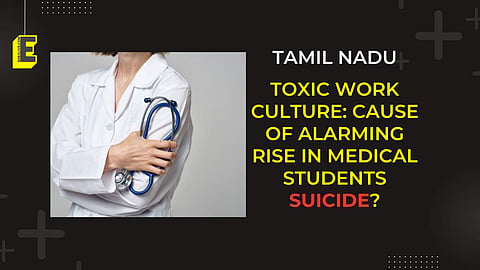

Long working hours, tedious and tiring shifts, many cases, staff crunch, politics and discrimination by seniors are just a few sufferings and concerns of the postgraduate (PG) resident doctors in Tamil Nadu.
The recent death of a second-year resident doctor Dr Sugirtha Sivakumar has irked the current and other batches of PG resident doctors. The deceased cited the cause of death as sexual harassment, mental and physical abuse, torture and toxicity allegedly meted out by the Head of the Department of Anesthesiology and two other seniors at Sree Mookambika Institute of Medical Sciences (SMIMS) in Tamil Nadu.
Speaking to EdexLive, former batchmates expressed grief at the loss of a brilliant, soft-spoken and hardworking girl. When EdexLive spoke to students from other colleges, it was observed that the situation is the same in every medical college in the state.
Trouble from seniors
Dr V Vignesh Rajendran from Stanley Medical College who has a master's from the Department of General Surgery shared that his seniors would take advantage of the responsibility they had of training juniors.
Explaining this further, he claimed, "There is an unwritten rule that first-year resident doctors are not allowed to sit during the admission of patients and this is called First Year Syndrome. And the consequences are thick legs including other ailments."
Vignesh shared that he was personally attacked by his seniors for leaning on the table during a tedious work shift. "Seniors called my friends and asked, 'How can he lean on my table?'" he said, adding that his seniors lack empathy.
As per Dr Vignesh, this is how the division of labour works between the postgraduate residents:
First years: Basic work, generic paperwork, writing medical records of patient's condition, discharge summary, insurance paperwork checks and more
Second years: Operations and emergency cases, supervising first-year and extending care
Thirds years: Sit, command and delegate work to second-years
"This hierarchy is toxic and the load of work on the first and second years is tremendous, ranging from admitting more than 150 cases among the 300-400 cases per day." Giving more details, Vignesh admitted that the surgery speciality is toxic as the juniors have to learn from the seniors. Therefore, raising a voice against the seniors will result in juniors losing out on learning opportunities, he claimed.
Several repercussions?
"Because I was rebellious, the seniors used to refrain from assigning me cases in the Operation Theatre (OT) list. Hence from then on, I stopped raising my voice and decided to put my head down and follow the instructions of the seniors," he said. "I questioned myself, why I couldn't speak to my seniors. However, when I voiced my thoughts saying, 'This is wrong, I can't follow it,' my chances for attending the cases were being cut," he told EdexLive.
Further, he recalled that he was working for 72 hours continuously without a break to eat, refresh or even use the restroom.
"The situation for females was worse as they barely had the time to use the restroom," he stressed. "Initially, unable to overcome all this torture, suicidal thoughts did cross our mind but thinking about families and the sacrifices they had made for us held us back," he shares.
Situation- the same at all medical colleges?
Speaking to EdexLive, a previous batchmate of Dr Sugirtha, Dr Muthu Arasi said, "The situation is the same in every college in the state."
Remembering her close friend Dr Sugirtha who took the extreme step, she said Sugirtha always spoke about her hectic schedule and the pressure she faced to work longer hours but she never spoke about harassment or abuse.
What can the solution be?
Considering the workload and hectic work shifts, Vignesh opines that first the work should be delegated equally among the juniors and the seniors. Secondly, the Chief should delegate a certain number of cases to each PG and maintain a log of cases, he adds.
Further, he cited an instance of the All India Institute of Medical Sciences (AIIMS) in New Delhi where the first-year students are assigned the easiest and most number of cases while the final years are assigned the most complicated cases. "Following this kind of split in cases will solve the problem and there would be no compromise on patient care as final years experience is needed for complicated cases," he said.
With toxic culture breeding in the medical education of India, parents of the students also share their concerns in view of Sugirtha's death. Speaking to EdexLive, Cinematographer and father of Sugirtha's friend Alphonse Roy said that no parents should experience what Sugirtha's parents are going through.
And he sounded positive that the Tamil Nadu government will extend its support and will work for justice in Sugartha's incident.
